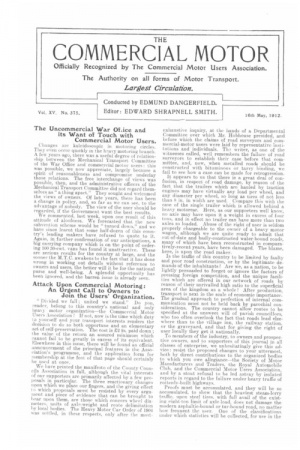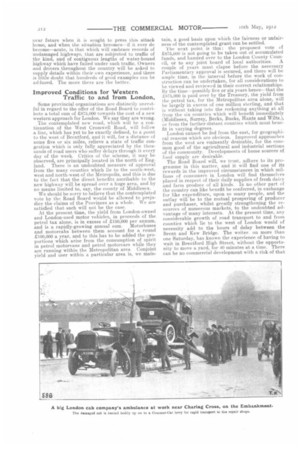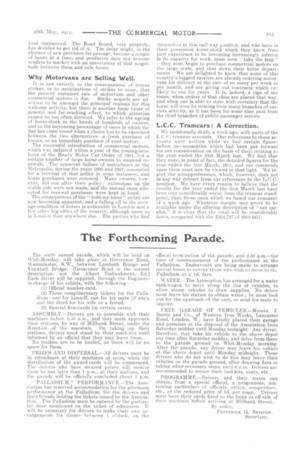The Uncommercial War Of ,ice and its Want of Touch with Commercial Motor Users.
Page 1

Page 2

Page 3

If you've noticed an error in this article please click here to report it so we can fix it.
Changes are kaleidoscopic in motoring circles. They even occur quickly in the heavy motoring branch. A few years ago, there was a useful degree of relationship between the Mechanical Transport Committee of the War Office and commercial motor users : this was possible, we now appreciate, largely because a spirit of reasonableness and compromise .underlay those relations. The free interchange of views was possible, then, and the administrative officers of the Mechanical Transport Committee did not regard themselves as " a thing apart." They sought and welcomed the views of owners. Of late years, there has been a change in policy, and, so far as we can see, to the advantage of nobody. The view of the user should be regarded, if the Government want the best results.
We commented, last week, upon one result of this attitude of aloofness. We forecasted that the new subvention scheme would be "turned down," and we have since learnt that some half-dozen of this country's leading makers have refused to quote to it. Again, in further confirmation of our anticipations, a big carrying company which is on the point of ordering 100 30-cart. vans has found it unattractive. These are serious results for the country at large, and the sooner the M.T.C. awakens to the fact. that it has done wrong in working out details without reference to owners and users, the better will it be for the national purse and well-being. A aplendid opportunity has been ignored, and the barren issue is already seen.
Attack Upon Commercial Motoring : An Urgent Call to Owners to Join the Users' Organization.
" Divided we fall ; united we stand." Do you, reader, belong to this country's national and only heavy motor organization—the Commercial Motor Users Association ? If not, now is the time which duty to yourself and your transport interests renders the decision to do so both opportune and an elementary act of self-preservation. The cost is 22 2s. paid down ; the value of the return an assured minimum which cannot fail to be greatly in excess of its equivalent. Elsewhere in this issue, there will be found an official announcement of the principal features in the Association's programme, and the application form for membership at the foot of that page should certainly be used at once.
We have printed the manifesto of the County Councils Association in full, although the vital interests of our supporters are primarily affected by a few proposals in particular. The three reactionary changes upon which we place our fingers, and the giving effect o which proposals must be resisted by every argument and piece of evidence that can be brought. to hear upon them, are those which concern wheel diameters. units of axle-weight and route delimitation by local bodies. The Heavy Motor Car Order of 1904 was settled, in these respects, only after the most
exhaustive inquiry, at the hands of a Departmental Committee over which Mr. Hobhouse presided, and before which the claims of road surveyors and commercial-motor users were laid by representative institutions and individuals. The writer, as one of the witnesses called, well remembers the failure of road surveyors to establish their case before that committee, and, now, when metalled roads should be constructed with bituminous or tarry binding, we fail to see how a case can be made for retrogression.
It appears to us that there is a great deal of confusion, in respect of road damage, by reason of the fact that the trailers which are hauled by traction engines may have virtually any load per wheel, and any diameter per wheel, so long as tires of not less than 8 in. in width are used. Compare this with the case of the single trailer which is allowed behind a heavy motorcar. Here, as our supporters well know, no axle may have upon it a weight in excess of four tons, and in effect no trailer can have more than two axles so loaded. Abuse of the right of user is seldom properly chargeable to the owner of a heavy motor wagon, although we are quite ready to admit that out-of-dale and badly-constructed water-bound roads, many of which have been reconstructed in comparatively-recent years, have been damaged. The blame, here, is upon the road maker. Is the traffic of this country to be limited by faulty and poor road construction, or by the legitimate demands of the inhabitants'? Are we, as a nation, to be lightly persuaded to forget or ignore the factors of pressing foreign competition, and the unique facilities which are offered in our network of roads by reason of their unrivalled high ratio to the superficial area of the kingdom as a whole? After production, transport is next in the scale of economic importance. The gradual approach to perfection of internal communication must not be held back by parochial considerations. The country cannot allow routes to be specified at. the unsweet will of parish councillors, who too often overlook the fact that roads lead elsewhere than to the village inn, the railway station, or the graveyard, and that for giving the right of user locally they get it nationally. To members of the industry, to owners and prospective owners, and to supporters of this journal in all classes of enterprise, we unhesitatingly give this advice : resist the proposed changes to your uttermost, both by direct contributions to the organized bodies to which you owe allegiance—the Society of Motor Manufacturers and Traders, the Royal Automobile Club, and the Commercial Motor Users Association, and by a stout refusal to be led astray by isolated reports in regard to the failure under heavy traffic of rottenly-built highways. Proofs must he accumulated, and they will be so accumulated, to show that the heaviest steam-lorry traffic, upon steel tires, with full avail of the existing eight-ton limit of axle-load, does not damage the modern asphaltic-bound or tar-bound road, no matter how frequent the user. One of the classifications under which statistics will be collected, for use in the near future when it is sought to press this attack home, and when the situation becomes—if it ever do become—acute, is that which will embrace records of undamaged highways, that are subjected to traffic of the kind, and of contiguous lengths of water-bound highway which have failed under such traffic. Owners and drivers throughout the country will be asked to supply details within their own experience, and there is little doubt that hundreds of good examples can be adduced. The more there are the better.
Improved Conditions for Western Traffic to and from London.
Some provincial organizations are distinctly unrestful in regard to the offer of the Road Board to contribute a total sum of £875,000 towards the cost of a new western approach for London. We say they are wrong.
The contemplated new road, which will be a continuation of the West Cromwell Road, will follow .a line, which has yet to be exactly defined, to a point to the west of Brentford, and it will, for a distance of some five or six miles, relieve a state of traffic congestion which is only fully appreciated by the thousands of road users who suffer delays through it every day of the week. Critics of the scheme, it may be observed, are principally located in the north of England. There is an undoubted measure of approval from the many counties which lie to the south-west, west and north-west of the Metropolis, and this is due to the fact that the direct benefits ascribable to the new highway will be spread over a huge area, and by no means limited to, say, the county of Middlesex.
We should be sorry to believe that the contemplated vote by the Road Board would be allowed to prejudice the claims of the Provinces as a whole. 1%e are satisfied that such will not be the case.
At the present time, the yield from London-owned and London-used motor vehicles, in proceeds of the petrol tax alone, is in excess of £150,000 per annum, and is a rapidly-growing annual sum. Motorbuses and motorcabs between them account for a round £100,000 a year, and to this has to be added the proportions which arise from the consumption of spirit in petrol motorvans and petrol motorcars while they are running within the Metropolitan area Conjoint yield and user within a particular area is, we main
tam, a good basis upon which the fairness or unfairness of the contemplated grant can be settled.
The next point is this : the proposed vote of 2875,000 is not going to be taken out of accumulated funds, and handed over to the London County Coun cil, or to any joint board of local authorities. A couple of years must elapse before the necessary Parliamentary approval is secured, and there will be ample time, in the interval before the work of construction can be undertaken, for all considerations to be viewed and reviewed in their correct relationships. By the time—possibly five or six years hence—that the £875,000 is paid over by the Treasury, the yield from the petrol tax, for the Metropolitan area alone, will be largely in excess of one million sterling, and that is without taking into the reckoning anything at all from the six counties which will benefit immediately (Middlesex, Surrey, Berks, Bucks, Hants and Wilts.), or from the farther-distant counties which must benefit in varying degrees. London cannot be fed from the east, for geographical reasons which are obvious. Improved approaches from the west are eminently desirable, for the coinmen good of the agricultural and industrial sections of the community. Developments of home sources of food supply are desirable. The Road Board will, we trust, adhere to its programme in this matter, and it will find one of its rewards in the improved circumstances in which millions of consumers in London will find themselves placed in respect of their daily supplies of fresh dairy and farm produce of all kinds. In no other part of the country can like benefit be conferred, in exchange for like expenditure, upon so many people, and the outlay will be to the mutual prospering of producer and purchaser, whilst greatly strengthening the resources of numerous markets, to the undoubted advantage of many interests. At the present time, any considerable growth of road transport to and from counties which lie to the west of London would of necessity add to the hours of delay between the Brent and Kew Bridge. The writer, on more than one Saturday, has known the experience of having to wait in Brentford High Street, without the opportunity to move a yard, for 40 minutes at a time. There can be no commercial development with a risk of that
kind unremoved. The Road Board, very properly, has decided to get rid of it. The delay might, in the absence of new provision for passage, become a couple of hours at a time, and producers dare not become senders to market with an uncertainty of that magnitude between them and sale hours.
Why Motorvans are Selling Well.
It is not entirely to the consequences of recent strikes, or to anticipations of strikes to come, that. the present. sustained sale of motorvans and other
commercial motors is due. Strike sequels are admitted to be amongst the principal reasons for this welcome activity, but there is another basic cause of general and far-reaching effect, to which attention cannot be too often directed. We refer to the ageing of horse-stock in the hands of hundreds of owners, and to the increasing percentage of cases in which the day has come round when a choice has to be exercised between the, two alternativesa fresh purchase of horses, or an immediate purchase of road motors.
The successful introduction of commercial motors, which was initiated within a year of the coming-intoforce of the Heavy Motor Car Order of 1901, led a certain number of large horse-owners to suspend renewals. The apparent failure of motorbuses in the Metropolis, during the years 1906 and 1907, accounted for a reversal of that policy in some instances, and horse purchases were resumed. Many owners, however, did not alter their policy ; extensions on the stable side were not made, and the annual sums allocated for renewal purchases were kept in hand. The consequences of the " hold-my-hand " policy are now becoming apparent, and a. falling off in the average condition of horses is noticeable in London and a. few other big cities of the country, although more so in London than anywhere else. The parties who find themselves in this half-way position, and who have in their possession horse-stock which they know from past experience to be becoming increasingly inferior in its capacity for work, must soon " take the leap" -.they must begin to purchase commercial motors on the large scale, and shut down their horse departments. We are delighted to know that some of this country's biggest carriers are already ordering motorvans for delivery at the rate of so many per week or per month, and are giving out. contracts which are likely to run for years. it is, indeed, a sign of tile times, when orders of that class are placed that way, and when one is able. to state with certainty that the horse will soon be missing from many branches of carriers activity, as it has been for some time past. from the chief branches of public-passenger service
L.C.C. Tramcars : A Correction.
We incidentally dealt, a. week ago, with parts of the L.C.C. tramcar accounts. Our references to those accounts were written while we had certain figures before us—summaries which had been put forward for our consideration on the basis of their relating to the year ended the 31st March last. We find that they were, in point of fact, the detailed figures for the year ended the 31st March, 1911, and our comments upon them must now be viewed in that light. We regret the misapprehension, which, however, does not in any way detract from our references to the L.C.C. position. We have every reason to believe that the results for the year ended the 31st March last have been very considerably worse, from the tramcar standpoint, than those, upon which we based our comment of a week ago. Whatever margin may prove to be available under the alluring description of " net surpins," it is clear that the total will be considerably down, compared with the £232,727 of 1910-1911.




















